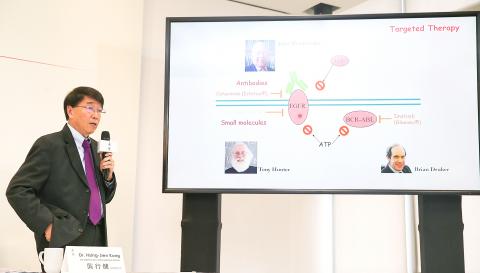Tony Hunter, Brian Druker and John Mendelsohn have won this year’s Tang Prize in biopharmaceutical science for their breakthroughs in developing targeted cancer therapies, the Tang Prize Selection Committee announced yesterday.
Their research and findings of protein tyrosine phosphorylation and tyrosine kinases as oncogenes have led to successful targeted cancer therapies, the committee said.
The three winners, all Americans, have shown how basic science can lead to clinical applications that benefit humankind, said Chang Wen-chang (張文昌), a member of Academia Sinica and the convener of the selection committee.

Photo: CNA
Hunter demonstrated that a mechanism called tyrosine phosphorylation acts as a master on/off switch for a number of key proteins that are critical for successful cancer therapies, the committee said.
Hunter, a professor of biology at the Salk Institute, gave birth to the field of targeted therapies after discovering in 1979 the mechanism of tyrosine phosphorylation and that the oncogene Src is a tyrosine kinase.
The historic discovery paved the way for active research in the following two decades on tyrosine kinase oncogenes, ultimately leading to the development of tyrosine kinase inhibitors (TKIs).
Based on Hunter’s discovery, Druker, the director of Oregon Health & Science University’s Knight Cancer Institute, led the successful clinical trial of a cancer-fighting drug called imatinib.
The drug turned chronic myelogenous leukemia, a cancer that once had a very low survival rate, into a manageable condition.
Gleevec, a brand of imatinib, shuts off oncogenic signals by inhibiting Abl-protein tyrosine kinases as predicted by Hunter’s original research, the committee said.
Gleevec has also been successfully used in the treatment of acute lymphocytic leukemia and certain types of gastrointestinal stromal tumors by inhibiting other tyrosine kinase oncoproteins.
There are more than 26 TKIs that have been approved for clinical use. All of the discoveries have Druker’s first successful trials to thank because they spurred this still burgeoning targeted therapy era, the committee said.
John Mendelsohn, president emeritus of MD Anderson Cancer Center, took another approach to combating cancer.
An alternative way of shutting off the activities of tyrosine kinases on the cell surface (receptor tyrosine kinase) is to develop antibodies against the extracellular domain of the receptor, the committee said.
In such a way, the natural ligand, or growth factor, can no longer bind and the receptor tyrosine kinase is no longer activated. Mendelsohn and his team came up with the idea that antibodies targeting the epidermal growth factor receptor (EGFR) may be an effective strategy for cancer treatment.
Mendelsohn led his team in conducting preclinical research and proceeded to develop the anti-EGFR antibody cetuximab, which eventually won the US Food and Drug Administration’s approval for the treatment of colon cancer and head/neck cancer.

Alain Robert, known as the "French Spider-Man," praised Alex Honnold as exceptionally well-prepared after the US climber completed a free solo ascent of Taipei 101 yesterday. Robert said Honnold's ascent of the 508m-tall skyscraper in just more than one-and-a-half hours without using safety ropes or equipment was a remarkable achievement. "This is my life," he said in an interview conducted in French, adding that he liked the feeling of being "on the edge of danger." The 63-year-old Frenchman climbed Taipei 101 using ropes in December 2004, taking about four hours to reach the top. On a one-to-10 scale of difficulty, Robert said Taipei 101

Nipah virus infection is to be officially listed as a category 5 notifiable infectious disease in Taiwan in March, while clinical treatment guidelines are being formulated, the Centers for Disease Control (CDC) said yesterday. With Nipah infections being reported in other countries and considering its relatively high fatality rate, the centers on Jan. 16 announced that it would be listed as a notifiable infectious disease to bolster the nation’s systematic early warning system and increase public awareness, the CDC said. Bangladesh reported four fatal cases last year in separate districts, with three linked to raw date palm sap consumption, CDC Epidemic Intelligence

Two Taiwanese prosecutors were questioned by Chinese security personnel at their hotel during a trip to China’s Henan Province this month, the Mainland Affairs Council (MAC) said yesterday. The officers had personal information on the prosecutors, including “when they were assigned to their posts, their work locations and job titles,” MAC Deputy Minister and spokesman Liang Wen-chieh (梁文傑) said. On top of asking about their agencies and positions, the officers also questioned the prosecutors about the Cross-Strait Joint Crime-Fighting and Judicial Mutual Assistance Agreement, a pact that serves as the framework for Taiwan-China cooperation on combating crime and providing judicial assistance, Liang

US climber Alex Honnold left Taiwan this morning a day after completing a free-solo ascent of Taipei 101, a feat that drew cheers from onlookers and gained widespread international attention. Honnold yesterday scaled the 101-story skyscraper without a rope or safety harness. The climb — the highest urban free-solo ascent ever attempted — took just more than 90 minutes and was streamed live on Netflix. It was covered by major international news outlets including CNN, the New York Times, the Guardian and the Wall Street Journal. As Honnold prepared to leave Taiwan today, he attracted a crowd when he and his wife, Sanni,